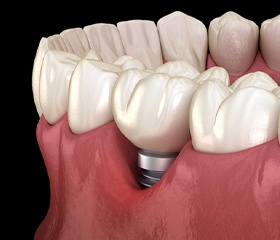Dental Implant Failure & Salvage – Port Orange, FL
Saving Your Restored Smile
Dental implants are successful most of the time. In fact, for more than 90% of patients, their new teeth are still thriving 10 years or longer after their initial treatment. However, it must be acknowledged that a failed dental implant in Port Orange can occur. On this page, we’ll discuss reasons for dental implant failure, symptoms you should be on the lookout for, and how our team may be able to salvage your restored smile.
Why Do Dental Implants Fail?

The most common cause of dental implant failure is an infection known as peri-implantitis. It occurs when an infection attacks the tissue around an implant. It can get so bad that the gums and jawbone begin to deteriorate, eventually shrinking to the point where they can no longer support the implant. Missteps in oral hygiene are often the cause of peri-implantitis, but genetics and other factors can also contribute to its development.
Of course, peri-implantitis is just one reason why a dental implant might fail. Physical trauma, certain medical conditions, and failure of an implant to bond with the surrounding bone can also endanger implants’ success.
Symptoms of Failed Dental Implants

There are two broad categories of dental implant failure. Early failure occurs soon after the initial implant placement surgery. Late failure can happen anytime, even years or decades after the initial surgery. Hence, you should always keep an eye on your oral health and be alert to any signs of a potential problem.
Some symptoms that might indicate a failed dental implant include:
- Severe or unusual pain. Some discomfort is normal after implant placement surgery. However, severe pain or pain that happens unexpectedly are both causes for concern.
- Difficulty chewing. After you adapt to your dental implants, you should be able to eat virtually anything with ease. Problems with chewing indicate that something might be amiss.
- Signs of infection. Pus, bleeding gums, swollen gums, and receding gums are all signs of a possible infection and call for immediate professional attention.
- An implant feels loose. In some cases, this is merely a problem with an implant’s restoration. In other cases, it points to a problem with the implant itself.
How Dental Implant Salvage Works

As soon as you notice that something is off with your dental implants in Port Orange, give us a call. The earlier you receive treatment, the more likely it is that we will be able to address the problem without using any extensive or complex procedures.
During your appointment, we will perform a visual examination, learn more about your symptoms, and possibly take some X-Rays. After we evaluate the problem, we will be able to recommend a treatment plan. In some cases, antibiotic therapy or a new restoration might be able to get your oral health back on track. However, it is also possible that we will have to remove a dental implant altogether. Then, you might need a bone graft or other restorative treatment. After your mouth recovers, it may be possible to place a new implant.
